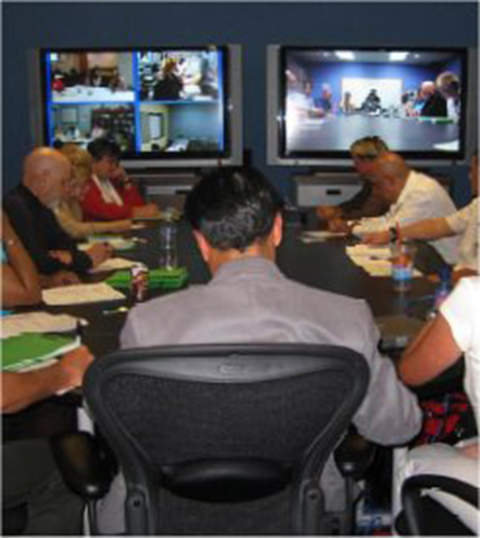The University of New Mexico’s Project Extension for Community Healthcare Outcomes (Project ECHO) links university healthcare specialists with rural and prison-based clinicians to improve the level of care provided to patients in underserved areas of the state. The program focuses on patients who suffer from complex, chronic diseases.
The program launched in 2002 as a way to treat thousands of New Mexicans afflicted with hepatitis C. Throughout the state 32,000 residents needed treatment, but remote rural and prison health centers lacked the necessary expertise to treat the disease.
At the time, Dr Sanjeev Arora from the University of New Mexico (UNM) Health Sciences Center was one of the few physicians in the state qualified to treat the disease. “I could only treat 70 to 90 hepatitis C patients per year in my clinic, which left us with a six-month patient waiting list,” recalls Arora, founder of Project ECHO. “And these were the lucky patients who lived near Albuquerque or who could afford the time and expense of traveling to see a specialist on a monthly basis for treatment that lasts a year.”
So UNM’s Health Sciences Center teamed with Polycom, several state healthcare providers, and the New Mexico Corrections Department to deliver telemedicine to dispersed and hard-to-reach areas throughout the state. “We train caretakers within our network, and in turn, they use their knowledge to more effectively treat patients in their local communities,” says Arora. Arora and his team determined that, through Project ECHO, UNM and its partners would concentrate on common diseases that:
- Have complex management programs
- Require evolving types of treatment
- Have measurable, improved outcomes as a result of treatment
- Would result in serious outcomes if left untreated
Hepatitis C was the program’s initial focus, particularly because New Mexico has a very high rate of infection. The disease is curable, but without treatment, it can be fatal. The challenge was that treatment is complicated and developing expertise in the area takes several years.
Using video to connect with caregivers
Arora and the Project ECHO team knew they could meet that challenge through strategic use of visual communications solutions from Polycom.
Since Project ECHO’s inception, the team has implemented more than 40 Polycom HDX™ and Polycom VSX® video conferencing systems and a Polycom RMX 2000® real-time media conferencing platform for multisite conferences. Leveraging the Polycom RSS™ 2000 recording and streaming server and the Polycom Video Media Center™ (VMC) 1000 video content management solution, the organization is also able to record and stream video conferences to viewers on the Internet and create video content that is made available for on-demand playback.
The Polycom solution has allowed Arora and his team to host interactive educational sessions on hepatitis C. This in turn has translated into improved and more informed healthcare for patients around the state.
In its first five years, Project ECHO helped local caregivers medically manage approximately 3,000 people infected with hepatitis C. “These patients would not have had access to the proper treatment for their condition,” says Arora.
Building on ECHO’s initial success
The project has been such a success that Arora has expanded it to cover several more areas of expertise, including cardiovascular risk reduction, childhood obesity, pediatrics, telepsychiatry, chronic pain, high-risk pregnancy, HIV/AIDS, integrated addiction/psychiatry, psychotherapy, pulmonary diseases and rheumatology.
Daily video conferences allow for healthcare education that combines both face-to-face communication with interactive content and the ability to stream, record and rebroadcast the information on-demand.
“With Project ECHO, we have specialists in different fields who dial into our clinics every Wednesday from UNM in Albuqurque,” says April Grisetti-Nail, P.A.-C, who treats patients in El Centro Family Health Center in Espanola, a city of less than 10,000 in north central New Mexico – and home to one of the most severe heroin problems in the country. “Through the Project ECHO video conferencing network, we can bring specialty care to patients here in Espanola who might not otherwise have access to it.”
Creating a ‘win-win situation’ with Polycom
“Polycom visual communication solutions have provided a way to extend our knowledge to healthcare providers around the state in an efficient and cost-effective way,” says Arora. “It’s a win-win situation because they learn to become experts in their field while also using that knowledge to immediately improve patient care.”
Wesley Pak M.B.A., systems and programming manager for Project ECHO, has been intimately involved in the technology behind the program. Pak says he chose Polycom because it offers a complete, integrated solution based on open standards.
“There is tremendous value in our ability to stream, record and manage our video content as part of the program,” says Pak. “It allows us to extend our resources to broader audiences by turning real-time events into repeatable, educational content.”
Moving beyond New Mexico
With a broader set of services and a growing video communications network, Project ECHO continues to grow.
“We’re now looking to extend the project both within the state of New Mexico and to other states,” says Pak. “Currently, we’re working with the state of Washington to implement a similar telemedicine program for their underserved communities, and it’s the Polycom solution that makes it all possible.”
Pak and his team are also adding the Polycom Converged Management Application™ (CMA™) 5000, which will simplify the provisioning and management of visual communication solutions across the entire Project ECHO network. This means that practitioners will be able to see live video training sessions from anywhere with their CMA Desktop.
And to increase the population of Project ECHO partners, the UNM team plans to use Polycom CMA Desktop™, a highly scalable and cost-effective video collaboration application for personal computers. CMA Desktop offers the chance to add providers to the network at very little cost. This makes it possible for the program to increase exponentially over the next several months – training more doctors and nurses, and helping more patients.
For those working to bring world-class healthcare to even more patients in remote and underserved locations, that’s a prescription for success.
“I know that Project ECHO helps save lives and improves the quality of life for our patients every day,” says Arora. “I couldn’t be happier with the results.”








